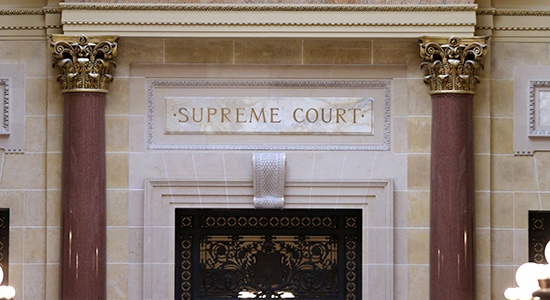
March 3, 2017 – Convicted of murder in the early 1980s, Jeffrey Denny filed a postconviction motion in 2014, claiming he was entitled to forensic DNA testing of evidence from the crime scene. Recently, the state supreme court said he was not.
In State v. Denny, 2017 WI 17 (Feb. 28, 2017), a 4-3 majority ruled that Denny did not meet the statutory requirements for postconviction DNA testing at public expense. And a 5-2 majority overruled a 2005 decision that allowed DNA testing at private expense when a person does not satisfy requirements for publicly funded DNA testing.
“We find it unlikely that the legislature would set forth detailed requirements regarding whether DNA testing may occur … and who will pay for that testing … only for a movant to bypass these provisions and obtain testing at private expense using a subsection of the statute that does not say a word about such testing,” Justice Annette Ziegler wrote.
Wis. Stat. section 974.07 governs postconviction DNA testing. Those convicted of a crime can request DNA testing of evidence if it’s relevant to the investigation or prosecution, a government agency has the evidence, and the evidence has not been tested before, or new scientific testing would likely produce more accurate results.
The statute sets out the procedures for requesting DNA testing. The movant must serve the district attorney with a copy of the request and upon demand.
In turn, the district attorney must disclose whether biological material has been previously tested and must make available prior test results and/or physical evidence containing biological material that is in the possession of a government agency.
The court can order DNA testing only if several requirements are met. For instance, it must be “reasonably probable” that the movant would not have been prosecuted or convicted if exculpatory DNA test results were previously available.
Under another provision, section 974.07(12) the court may order the movant to pay the costs of testing if the court finds that the movant is not indigent.
Denny, who was convicted with his brother for a fatal stabbing that occurred in 1982, argued that he met the criteria for obtaining postconviction DNA testing, that is, that the government still possessed blood-stained evidence that could be exculpatory.
He also argued that the circuit court should order the testing because it was “reasonably likely” he would not have been prosecuted or convicted if DNA testing were available.
The circuit court denied Denny’s motion for DNA testing. But a state appeals court reversed, concluding Denny met the requirements to get publicly funded DNA testing.
Majority Rules
A 4-3 majority reversed the appeals court, concluding that Denny did not meet the requirements to get publicly funded DNA testing and the circuit court was right to deny his motion. A 5-2 majority also overruled a 2005 decision, State v. Moran, that still allowed a person to obtain DNA testing of evidence if they paid for it themselves.
That is, a movant could pay for DNA testing if the evidence is relevant to the investigation or prosecution, a government agency has the evidence, and it has not been tested before, or new scientific testing would likely produce more accurate results.
Under Moran, if privately funding the testing, the movant did not have to show that it would be “reasonably probable” that the movant would not have been prosecuted or convicted if exculpatory DNA test results were previously available.
But the majority overruled Moran. “Each suggestion that one of our cases must be overturned must be scrutinized individually, and sometimes stare decisis must yield to other important principles of policy,” wrote Justice Ziegler. “This is one such occasion.”
The majority ruled that Moran is overruled to the extent that it allows movants to pay for DNA testing themselves if they don’t meet the requirements for court-ordered testing.
“Under [974.07], properly interpreted, convicted offenders can obtain postconviction forensic DNA testing of evidence,” Ziegler wrote. “This opinion simply recognizes the existence of, and applies, the limits that the legislature set on such testing.”
A 4-3 majority also ruled that Denny did not meet the requirements for court-ordered testing and thus could not obtain it at public or private cost. The majority noted other evidence, including many witnesses that testified that Denny and his brother told them they killed the victim and described certain events consistent with what happened.
“Even if exculpatory DNA testing results were available before prosecution and conviction, we are unable to conclude that it is reasonably probable that Denny would not have been prosecuted or convicted of his crime,” Justice Ziegler wrote.
Concurrence and Dissents
Chief Justice Patience Roggensack agreed that Moran should be overruled, but she concluded that Denny met the requirements to get court-ordered DNA testing.
Justice Ann Walsh Bradley dissented, joined by Justice Shirley Abrahamson. They argued that Moran should not be overruled and Denny was entitled to testing.
“Nothing in the DNA testing statute has changed in the decade since this court decided Moran, nor has the state presented any evidence that the statute has been unworkable in practice,” Justice A.W. Bradley wrote. “The only thing that has changed is the composition of this court.”
Justice Abrahamson wrote a separate dissent to note that the state did not raise the issue of overruling Moran in its petition for review and did not seek the court’s consent to raise it in its initial brief. Denny had moved to strike the argument.
